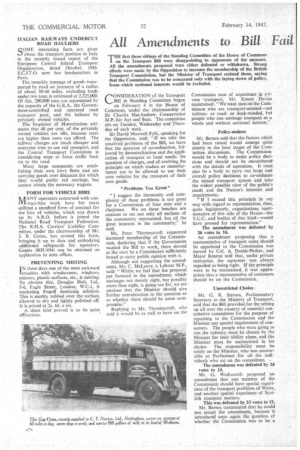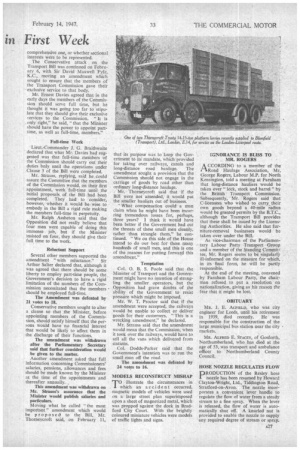All Amendments to Bill Fail
Page 28

Page 29

If you've noticed an error in this article please click here to report it so we can fix it.
in First Week
THE first three sittings of the Standing Committee of the House of Commons 1 on the Transport Bill were disappointing to opponents of the measure. All the amendments proposed were either defeated or withdrawn. Strong efforts were made by the Opposition to increase the membership of the British Transport Commission, but the Minister of Transport resisted them, saying that the Commission was to be concerned only with the laying down of policy, from which sectional interests would be excluded.
CIONSIDERATION of the Transport Bill in Standing Committee began on February 4 in the House of Commons, under the chairmanship of Sir Charles MacAndrew, Conservative M.P. for Ayr and Bute. The committee sits on Tuesday, Wednesday and Thursday of each week.
Sir David Maxwell Fyfe, speaking for the Opposition, said: "If we take the unsolved problems of the Bill, we have first the question of co-ordination, followed by decentralization and the application of transport to local needs; the question of charges, and of evolving the principle on which traders or manufacturers are to be allowed to use their own vehicles for the transport of their own goods.
"Problems Too Great"
"I suggest the immensity and complexity of these problems is too great for a Commission of four men and a chairman. We on these benches are anxious to see not only all sections of the community represented, but all the great interests in the community," he said.
Mr. Peter Thorneycroft supported increased membership of the Commission, declaring that if the Government wanted the Bill to work, there should at the start be a Commission sufficiently broad to carry public opinion with it.
Although not supporting the amendment, Mr. C. McLeavy, a Labour M.P., said: "Whilst we feel that the proposal put forward in the amendment, which envisages not merely eight, but possibly more than eight, is going too far, we are anxious that the Minister should give further consideration to the question as to whether there should be some compromise." Replying to Mr. Thorneycroft, who said it would be as well to have on the
Commission men of experience in mivate transport, Mr. Ernest Davies maintained:," We want men on the Commisson who are transport-minded—not railwayor roador dock-minded, but people who can envisage transport as a whole and without sectional interest."
Policy-makers Mr. Barnes said that the factors which had been raised would emerge quite clearly in the later stages of the Committee discussions. The Commission would be a body to make policy decisions and should not be encumbered with the details of operation. it must also be a body to carry out large and overall policy decisions to co-ordinate the inland transport system and take the widest possible view of the public's needs and the Nation's interests and requirements.
"If I exceed this principle in any way with regard to representation, then, quite legitimately, organizations representative of this side of the House—the T.U.C. and bodies of that kind—would have pressed for representation."
The amendment was defeated by 26 votes to 16.
An amendment proposing that a representative of transport users should be appointed to the Commission was moved by Col. A. Dodds-Parker, and Major Renton said that, under private enterprise, the cnstomer was always regarded as being right. If the principle were to be maintained, it was appropriate that a representative of customers should be on the Commission.
Unrestricted Choice I
Mr. G. R. Strauss, Parliamentary Secretary to the Ministry of Transport, said that the Bill provided for the setting up all over the country of essential consultative committees for the purpose of reporting to the Commission and the Minister any special requirement of consumers. The people who were going to run the industry must be chosen by the Minister for their ability alone, and the Minister must be unrestricted in his choice. The responsibility must be solely on the Minister, who was answerable to Parliament for all the individuals who sat on the committees. • The amendment was defeated by 26 votes to 14.
Mr. a Wadsworth proposed an amendment that one member of the Commission should have special experience of the transport problems of Wales, and another special experience of Scottish transport matters.
This was defeated by 23 votes to 15.
Mr. Barnes commented that he could not accept the amendment, because it introduced once again the question of whether the Commission was to be a
comprehensive one, or whether sectional interests were to be represented.
The Conservative attack on the Transport Bill was continued on February 6, with Sir David Maxwell Fyfe, K.C., moving an amendment which sought to ensure that the members of the Transport Commission gave their exclusive service to that body.
Mr. Ernest Davies agreed that in the early days the members of the Commission should serve full time, but he thought it was going too far to stipulate that they should give their exclusive ii-ervices to the Commission. "it is only right," he said, "that the Minister should have the power to appoint parttime, as well as full-time, members."
Full-time Work Lieut.Commander J. G. Braithwaite declared that what Mr. Davies had suggested was that full-time members of the Commission should carry out their duties hilly until the operations under Clause 3 of the Bill were completed. Mr. Strauss, replying, said, he could assure the Committee that the members of the Commission would, on their first appointment, work full-time until the initial proposals of the Bill had been completed. They had • to consider, however, whether it Would be:wise to embody in the Bill a rigid rule making the members full-time in perpetuity. Mr. Ralph Assheton said that the Opposition did not really believe that four men were capable of doing this immense job, but if the Minister insisted on four, they should give their full, time to the work.
Reluctant Support Several other members supported the amendment "with reluctance." Sir Arthur Salter declared that, although it was agreed that there should be some liberty to employ part-time people, the Government's decision to have a rigid limitation of the numbers of the Commission necessitated that the members should be employed full-time.
The Amendment was defeated by 21 votes to 18.
Conservative members sought to alter a clause so that the Minister, before appointing members of the Commission, should satisfy himself that the persons would have no financial interest that would be likely to affect them in the discharge of their functions.
The amendment was withdrawn after the Parliamentary Secretary said that further consideration would be given to the matter.
Another amendment asked that full information concerning Commissioners' salaries, pensions, allowances and fees should be made known by the Minister at the time of the appointments and thereafter annually. , This amendment was withdrawn on Mr. Strauss's assurance that the Minister would publish salaries and particulars.
Moving what he called " the most important" amendment which would be p r o posed to the Bill, Mr. Thorneycroft said, on February 11, that its purpose was to keep the Government to it mandate, which provided for taking over railways, canals and long-distance road haulage. The amendment sought a provision that the Commission should not engage in the carriage of goods by road other than ordinary long-distance haulage.
Mr. Thorneycroft said that if the Bill were not amended, it would put the smaller hauliers out of business.
" What compensation could a man claim when he might have been incurring tremendous losses for, perhaps, three years? I think it would have been better if the Government had cut the throats of these small men cleanly, rather than strangle them." he continued. "We on this side of the House intend to do our best for these many hundreds of small men, and this is one of the reasons for putting forwa41 this amendment."
Temptation Col. 0. B. S. Poole said that the Minister of Transport and the Government might have no intention of strangling the smaller operators, but the . Opposition had grave doubts of the ability of the Government to resist pressure which might be imposed. Mr. W. T. Proctor said that if the amendment were accepted, the railways • would be unable to collect or deliver goods for their customers. "This is a wrecking amendment," he declared. Mr. Strauss said that the amendment would mean that the Commission, when it took over the railways, would have to sell all the vans which delivered from stations.
Col. Dodds-Parker said that the Government's intention was to run the small man off the road.
The amendment was defeated by 24 votes to 16.
MODELS RECONSTRUCT MISHAP
TO illustrate the circumstances in which an accident occurred, magnetic models of vehicles were used on a large street plan superimposed upon a sheet of magnetized metal, which was propped against the dock in Bradford City Court. With the brightly coloured miniature vehicles were models of traffic lights and signs.
IGNORANCE IS BLISS TO MR. ROGERS
A CCORDING to a member of the r-YRoad Haulage Association, Mr. George Rogers, Labour M.P. for North Kensington, told a meeting at Farnham that long-distance hauliers would be taken over "lock, stock and barrel" by the British Transport Commission. 'Subsequently, Mr. Rogers said that C-licensees who wished to carry_ their own goods beyond a 40-mile radius would be granted permits by the B.T.C., although the Transport Bill provides that these shall be issued by the Licensing Authorities. He also said that furniture-removal businesses would be taken over under the Bill.
As vice-chairman of the Parliamentary Labour Party Transport Group and a member of the Standing Commit-;' tee, Mr. Rogers seems to be .singularW ill-informed on the measure for which, in its final form, he will be partly responsible.
At the end of the meeting, convened by Farnham Labour Party, the chairman refused to put a resolution on nationalization, giving as his reason the fear that it might be lost.
OBITUARY Mn. J. E. ACFIELD, who was city engineer for Leeds, until his retirement in 1939, died recently. He was responsible for the construction of the large municipal bus station near the city markets.
MR. ALFRED E. STACEY, of Gosforth, Northumberland, who has died at the age of 53, was transport and ambulance officer to Northumberland County Council.
HOSE NOZZLE REGULATES FLOW
PRODUCTION of the Resley hose 1 nozzle has been resumed by Howard Clayton-Wright, Ltd., Tiddington Road, Stratford-on-Avon. The nozzle incorporates a convenient lever handle to regulate the flow of water from a steady stream to a fine spray. When the lever is released, the flow of water is automatically shut off. A knurled nut is provided to enable the nozzle to supply 'any required degree of stream or spray.












































































